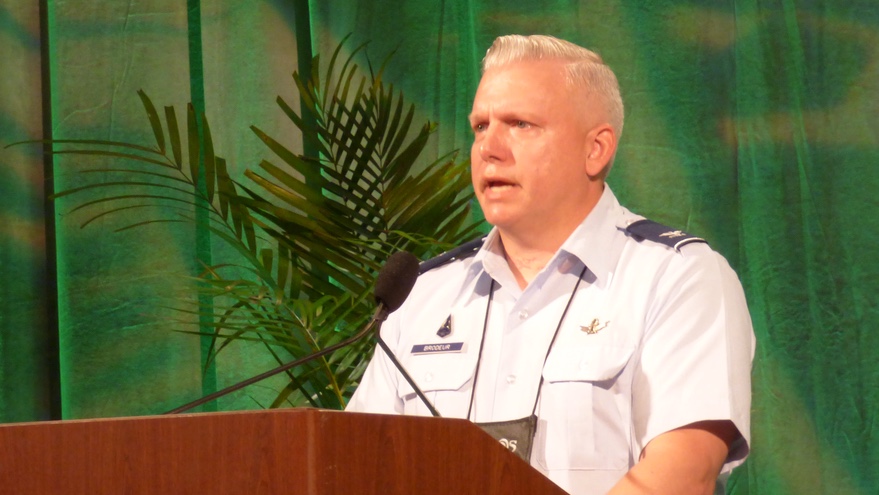WAILEA, Hawaii — The U.S. military will take space sustainability factors into account should it have to respond to an attack on its satellites, a Space Force official said Sept. 16.
Speaking at the Advanced Maui Optical and Space Surveillance Technologies, or AMOS, Conference here, Col. Scott D. Brodeur, director of the National Space Defense Center and director of operations for Joint Task Force Space Defense, discussed what the U.S. military might do in a space conflict with China, which demonstrated an anti-satellite weapon in a 2007 test that created thousands of pieces of debris.
“The way that they did this was catastrophic,” he said of that test. “We’re still tracking the debris that came from that. From my opinion, that is wholly irresponsible.”
The Defense Department is preparing for future military conflict with China or Russia in space, something top officials increasingly see as all but inevitable. Potential weapons that the U.S. might use in such a conflict are largely classified.
Asked at the conference if the military took space sustainability into consideration when preparing options to respond to an attack in space, Brodeur said “it absolutely does.”
“When we create our response options, that is absolutely part of the calculation: what’s this going to do to the overall sustainability of the environment,” he said, including extending that to how an adversary would react. “If our action creates another reaction where our adversaries respond in a debris-causing action, that environment is going to affect everyone.”
He suggested that options to respond to a hostile act in space might extend to other domains in addition to, or in place of, space. “First and foremost, we don’t want to have a war in space,” he said. “The nature of warfighting in space is that it’s just warfighting. So, we can take action in any other domain and be able to operate throughout the spectrum to respond. It doesn’t have to be what China and Russia are doing, which is just, in my opinion, belligerence in the domain.”
Brodeur echoed criticism by others in the military, including Chief of Space Operations Gen. John Raymond, about overclassification of military space capabilities. “We have hurt ourselves through our classification red tape,” he said. Reducing classification “helps us not only integrate better but it helps us message what our intentions are.”
He noted that the presentation he gave at the AMOS Conference likely would not have been possible a year ago because of classification issues. That presentation largely covered the work of Joint Task Force Space Defense, part of U.S. Space Command, in space domain awareness and space superiority command and control. He also discussed concerns about both Chinese ASAT capabilities and Russian tests of a “nesting doll” satellite, where one satellite released another with a kinetic kill mechanism.
“This is not the same conditions that we’ve been accustomed to” in space, he said. “This is becoming the norm.”
